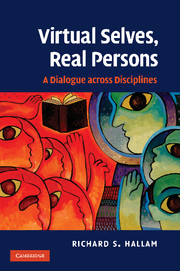Book contents
- Frontmatter
- Contents
- Acknowledgements
- Part I A constructionist framework for person and self
- Part II Person and self in science
- 8 Philosophy's legacy to a science of self
- 9 Self in mind and brain
- 10 Self, person as agent and natural causation
- 11 Self in child development
- 12 Self in human evolution
- 13 Loose ends and split hairs
- Bibliography
- Index
11 - Self in child development
Published online by Cambridge University Press: 04 August 2010
- Frontmatter
- Contents
- Acknowledgements
- Part I A constructionist framework for person and self
- Part II Person and self in science
- 8 Philosophy's legacy to a science of self
- 9 Self in mind and brain
- 10 Self, person as agent and natural causation
- 11 Self in child development
- 12 Self in human evolution
- 13 Loose ends and split hairs
- Bibliography
- Index
Summary
A study of the developing child promises to hold the key to what it might mean to acquire a sense-of-self and knowledge of self. At some point, the child must realise that its own perspective on the world differs from that of others. Putting this differently, we could say that the child becomes reflectively aware of itself as a unique individual with a unique perspective. The evidence from developmental research indicates that this is a long drawn-out process not a magical transformation. Moreover, there does not seem to be a fixed progression of stages, with each one replacing the last. And it is likely that modes of awareness, from simple to complex, coexist throughout life. As we all know, adults can be childlike at any age.
It is certainly difficult to project oneself into the mind of an infant. As adults, we are aware of existing in time, and the absence of a sense of temporal continuity is barely conceivable. Nonetheless, the evidence points to early infancy as being a time lived unreflectively in the present moment. This conclusion does not sit easily with the Cartesian assumption that consciousness is inherently self-reflective – that humans know that they know when they are conscious – whereas animals just ‘know’ and may indeed lack consciousness, responding like automata. Since the time of Descartes, research on animals, especially the primates, has led us to revise our assessment of their intellectual powers and capacity for conscious awareness.
- Type
- Chapter
- Information
- Virtual Selves, Real PersonsA Dialogue across Disciplines, pp. 215 - 230Publisher: Cambridge University PressPrint publication year: 2009



